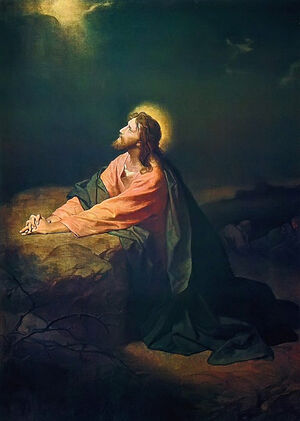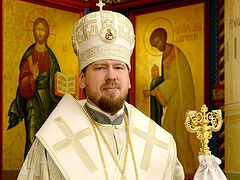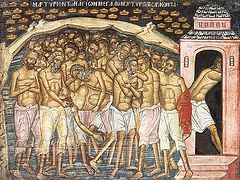A talk about the essence, issues and contradictions of Divine Providence in Orthodox Patristic teaching with Bishop Euthymius (Moiseyev) of Lukhovitsy, the Chairman of the Synodal Mission Department, head of the Commission for Work with Higher Educational Institutions and the Scientific Community of the Moscow Diocese, the Abbot of the Stavropegic Vysoko-Petrovsky Monastery in Moscow.
—What do you say to people who are afraid to accept the will of God in their lives? How can this fear be overcome?
—This fear can only be overcome through the experience of love. As the Apostle John says, There is no fear in love; but perfect love casteth out fear (1 Jn. 4:18). It is important to feel what Divine love for you is. And it is achieved by spiritual efforts and prayer, because through prayer and purification of the heart you acquire spiritual wisdom that allows you to understand these things. Spiritual experience and growth are needed. People gain this experience in the Church most quickly. Of course, you can walk your own path, but it is no coincidence that the Church is called a “treasury”, where many generations of Christians have left the “heirlooms” of their spiritual experience. Now our task is much easier, because we have access to it. In addition to the Gospel, the Church has Patristic works, the Lives of the saints and much more. If we take our generation, we have New Martyrs and Confessors of our Church who preached their faith in very difficult conditions and circumstances.
Thus, the ability to discern Divine Providence in your life depends on you. And prayer underlies spiritual experience because spiritual experience is that of your life or interaction with God.
—How does man’s free will correlate with Divine Providence, which determines many things?
—It must be understood that the human will is “included” in Divine Providence. It may contradict the will of God, but this does not affect the work of Divine Providence, which leads us to salvation. The Lord is able to turn even the most sorrowful circumstances in the life of a person or of an entire nation into good. From this perspective, the external details of a life are not decisive. Of course, we humanly want everything to be fine in our lives: a good job, a salary, a family, good health, children, a house and living in plenty. The Lord does not condemn these aspirations. But our life is such a multidimensional thing that it is very important to have some negative experience—suffering, sorrows, illnesses—something that causes us trouble. As a rule, a person who suffered hardships will much later in his life realize the benefits of what he has suffered.
There is a wonderful book by St. Luke (Voino-Yasenetsky), whose title coincides with a line from his letters: I Came to Love Suffering. Someone who doesn’t understand the essence of the matter will say that this is masochism. But the holy archpastor experienced harsh trials (he was imprisoned, tortured, beaten, his teeth were knocked out, his arms and legs were broken), but the man was not broken. He was not broken spiritually, he did not stop loving his Fatherland, he did not stop being a faithful son of his Church and a clergyman, while remaining an excellent surgeon. Clearly, there are few such people. But they are our spiritual beacons and show how we should react to such outwardly unpleasant circumstances of life.
This is the depth and power of Christianity. Paraphrasing the idea of St. John Chrysostom, we can say that for a Christian the worse the external circumstances of life the better for his spiritual state, since it encourages him to be spiritually awake and pray. And in circumstances that are favorable outwardly there may be a risk to the soul. Because man is prone to relaxation, losing vigilance and resting on his laurels, thinking how wonderful everything is, while his spiritual degradation has already begun. But the Lord by His mercy and Providence doesn’t let us relax and sends us trials—sometimes quite harsh ones.
Our country is going through a very tough and sad period right now. People are dying on the front in the Special Military Operation, blood is being shed, there are many refugees, and many are dead and wounded. Unfortunately, the nature of man is such that the power of the physical in him is so great that many simply cannot be reached otherwise. Even now, when there are combat operations—by saying this, I don’t mean to judge anyone—many people live as if nothing is happening. These people even ask not to be reminded about the horrors of war because they have their own lives and everything is fine with them: coffee with croissants in the morning, in the evening—a new production at the theater, a fashion show, a movie premiere, and a dinner at a good restaurant. In fact, these people live in an artificial world that they have created for themselves, and they believe that all life is like this. This view is very superficial, shallow and one-sided. In fact, the fullness and depth of life opens up exactly where a person feels the subtle line between life and death, and this line is thinner than we think. That’s why we pray to the Lord to protect us from sudden death, so as not to die without repentance.
—It is hard for many people, especially for non-believers, to accept that bad things in the world also happen by Divine Providence.
—That’s why faith is needed, and, to be more precise, trust in God. We need the experience of overcoming evil in its various manifestations, and the Lord can be known and revealed to us in overcoming trials. Unfortunately, such is the power of inertia of human nature that it can be very difficult for God to reach our souls. This is our propensity to sin, as the Holy Fathers put it, in which our self-indulgence and desire to separate ourselves from God, from Divine truth, from the Law of God, which the Lord has established, are manifested.
—How can a person understand the will of God about him?
—The will of God is revealed to us in the Holy Scriptures. The essence of our spiritual life, our spiritual growth consists in matching our actions and thoughts to the Gospel commandments. Another thing is that when we start matching them up, in most cases the results are not in our favor; but this is a rather different question. At least a person sees a difference between his real spiritual state and the ideal to which the Lord calls us. We should learn to see it. The Lord says: I am the way, the truth, and the life (Jn. 14:6). The way to salvation is exactly the path shown by the Savior Himself in the Gospel.
—What should I do if I doubt that the Lord is all good for me?
—The Lord doesn’t condemn doubt, which we see, in particular, from the Gospel—from the image of the Apostle Thomas who is called “doubting”, and even “unbelieving”. He was a man who was not ready to accept everything on faith immediately. And he put some Divine promises and words to the test. But as can be seen from the Gospel events, the Lord didn’t condemn him for that.
So, doubt as such is not blameworthy. Not everyone can have at once the faith that is needed in order to move mountains. A person who has come through the crucible of doubts can be much firmer in his beliefs than someone who has never been tested by doubt.
—As long as there is no feeling of being forsaken by God when you think that no one hears you...
 Heinrich Hoffman. Christ in the Garden of Gethsemane —If Christ felt forsaken by God, why shouldn’t human beings experience it as well? It can be hard for us to feel God’s presence if we have no experience of overcoming God-forsakenness—this is the “dialectic” of spiritual life. At what moment was the Savior’s prayer in the Garden of Gethsemane uttered? When the Savior by His human nature felt that He had been forsaken by God the Father. At least that’s how He perceived the situation at that moment. It is difficult for us to comprehend this on a rational level, since Christ is the God–Man; but His human nature was manifested in Gethsemane in its entirety. That’s why He prayed to the sweating of blood. Ultimately, Christ the Savior was crucified on the Cross, endured torment, the Passion and death before He rose again in glory and trampled down death by death.
Heinrich Hoffman. Christ in the Garden of Gethsemane —If Christ felt forsaken by God, why shouldn’t human beings experience it as well? It can be hard for us to feel God’s presence if we have no experience of overcoming God-forsakenness—this is the “dialectic” of spiritual life. At what moment was the Savior’s prayer in the Garden of Gethsemane uttered? When the Savior by His human nature felt that He had been forsaken by God the Father. At least that’s how He perceived the situation at that moment. It is difficult for us to comprehend this on a rational level, since Christ is the God–Man; but His human nature was manifested in Gethsemane in its entirety. That’s why He prayed to the sweating of blood. Ultimately, Christ the Savior was crucified on the Cross, endured torment, the Passion and death before He rose again in glory and trampled down death by death.
It is also very important not to become confused if we do not feel a state of grace. That is why both the Holy Fathers and father-confessors explicitly forbid seeking any special “states” in spiritual life. We shouldn’t substitute states for spiritual life! They may or may not visit the human soul, so in no case can spiritual life be reduced to some “states”, even the most sublime ones. In fact, Orthodoxy is a very realistic religion, which is not about blissful states, but rather about the harsh truth of this life. There is a wonderful Serbian hymn which contains the following words: “The eternal faith, the glorious faith, our Orthodox faith!” This is the faith that gives us the best opportunity to withstand all the hardships of this life.





